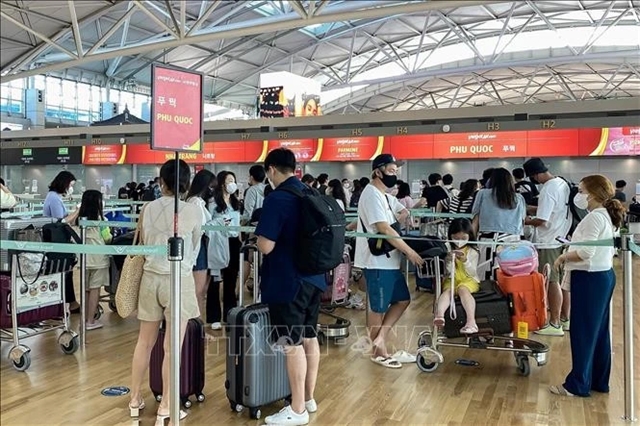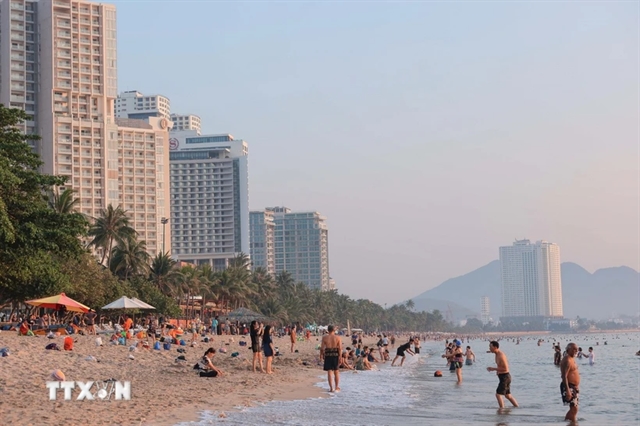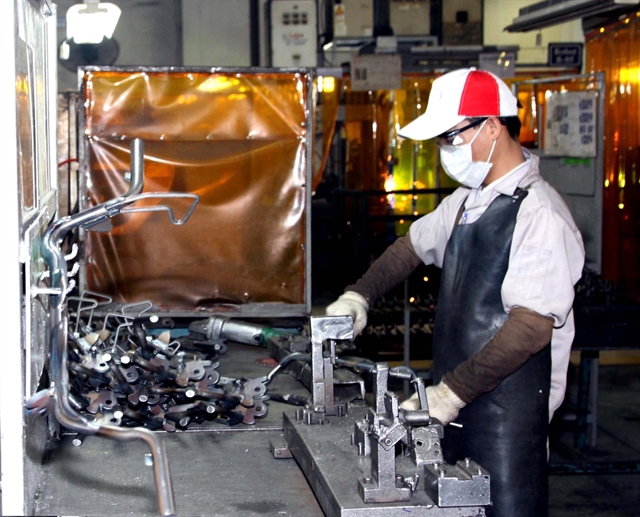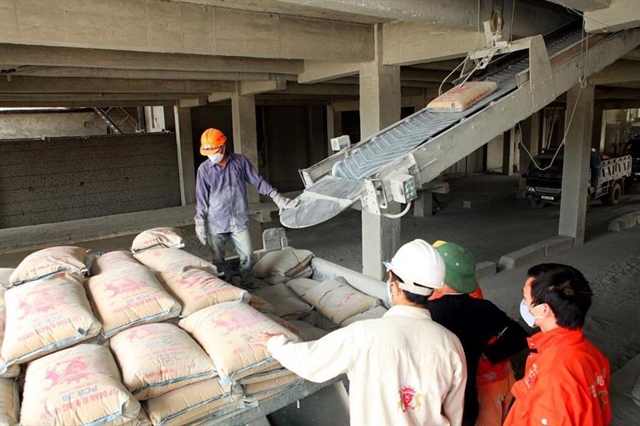

Tống Ngọc Hân deals with the eternal theme of purity versus sinfulness, with the onus of maintaining it and blame for failure invariably falling on women’s shoulders. Here, as elsewhere, man’s yearning for "purity" and "perfection" doesn’t relent, revealing an insecurity so deep that it runs through generations, making one wonder if it can ever be confronted and dealt with within a lifetime.
 |
| Illustration by Đào Quốc Huy |
By Tống Ngọc Hân
Don’t you feel jealous leaving your newly wed bride at home by herself? Old Lìn’s words were a breeze blowing past his face, and Pú didn’t pay attention. But when the breeze blew three times, he shuddered.
Getting wind of the news that Pú was taking his wife down to the gold field, the porters, almost 30 in all, flocked to behold the rare sight. Pú swelled up with pride. Old Lìn shook his head. This isn’t good. This isn’t good, he intoned. Why not? Your wife is too beautiful. Pú swung from pride to anxiety. But he had never felt at peace leaving his wife at home. He asked for a day off. The couple then went to gather some wood and build their own private tent.
Said Old Lìn: In the past the Nậm Pung stream was very beautiful. How long ago that was, Pú didn’t know, but when he first arrived, the streamed looked dry, jagged and muddy. Each of the gold diggers employed here came from a different hometown, each had a different last name, and each reeked of a different personality. No one yielded to anyone. No one trusted anyone.
Everybody obeyed Kha. Kha was a young boss, just over 30. In contrast to the tattered bunch around him, Kha always looked well groomed, boasting fragrant cigarettes, polished shoes and an expensive car. The food and beverages Kha consumed everyday were provided by a restaurant out in town.
Kha never sat down for meals with his workers. During police raids, while other gangs had to disband and flee with their machines, Kha’s men nonchalantly worked on. Said old Lìn: Under the earth, in the stream, there’s plenty of gold and silver and other precious things, but not any one can dig them up and sell for money.
Pú had been working at Nậm Pung for over a year, and hadn’t drunk with boss Kha even once. One day, out of the blue, Old Lìn whispered: “Today the boss ate with the workers!” Pú was surprised. Earlier, because Mẩy had nothing to do all day but tedious washing and needlework, Pú had asked Kha to give her some job. Kha said women are too fragile to stress themselves out.
Noticing Pú’s disappointment, Kha said Mẩy could cook for Pú’s team. Pú was overjoyed. There were twelve guys in his team, but the food was simple. Just a bowl of vegetable soup and a pot of some meat cooked with brine. Pú saw that his wife was obviously happier since. Now though, what did the boss mean by wanting to eat what Mẩy cooks?
Kha didn’t sit on the bamboo plank bed that the workers used for sleeping, eating, and idling around on rainy days. Kha sat on a plastic chair brought from his commander’s hut. The chair was placed near the rice cooker. In the past, Old Lìn was allowed to get off from work an hour earlier to go home to cook. Whether the food was undercooked, overcooked, salty, or bland, no one dared complain. The old man already had to work his ass off at the water trough all day from dawn till his limbs went limp.
Since Mẩy took over the cooking duties, the rice was glutinous and the soup was delicious. Mẩy sat on this side of the cooker. Kha sat on the other side. Separated by a rice cooker giving off steam. Mẩy’s cheeks were flushed. Kha cheerfully, excitedly poured wine for the men. It wasn’t the throat-scorching corn wine that Old Lìn brought down from Bắc Hà. Nor was it the very green paddy wine that Hẩu fetched out from Mường Khương. It was the boss’s wine, with a lengthy Western name. Oh why do those faraway villages have such difficult names!
Pú couldn’t remember the name of the wine, but he remembered its taste. It was very heavy, very strong, yet soft at the same time. Heady on the extraordinary refined wine, Pú glanced at the boss and saw Kha look at his wife in a very different way. It wasn’t the naked lustful look of the porter bunch having to live away from their wives. It wasn’t the inquisitive, measuring look of Old Lìn who was past his prime. Surely it wasn’t the ravenous look of the metal engineer uphill at the ore factory who was Kha’s buddy. Pú didn’t know how to describe that look. He only felt it was very soft and sweet, so easy to intoxicate one, exactly like the kind of wine in that beautiful glass bottle that Pú had unwittingly tasted.
Only now did Pú understand what Old Lìn meant when he said, “This isn’t good.” By nature, Kha was a straightforward and fair dealer. Ever since Mẩy had arrived, the boss had rewarded his workers more and rarely fined anyone. He was more accommodating and cordial, and his men were less pugnacious and foul-mouthed. The men even said, “Let your wife stay here until the end of the year for heaven’s sake.” Pú choked, and retorted, “Why don’t you scums bring your wives up here?” One guy, a Kinh (dominant ethnic group in Vietnam) said, “My wife is the grand-daughter of Madame Thị Nở*. If I bring her here, the Nậm Pung waters may reverse course and make it impossible to pan for gold.” One guy guffawed so violently that the plank bed shook. Some didn’t understand the joke and looked confused. Pú looked confused too.
After that meal, Pú began pestering Mẩy. Stop washing your hair incessantly! What shits on your head that you have to wash your hair every few days? Why do you take showers so often? What are you embroidering handkerchiefs for? Or, there’s still plenty of firewood, why are you bringing so much more? Do you like to go into the forest? Do you like secluded places? It went to absurd lengths. Once, Pú said: Why don’t you stop making your rice so viscous?
At night, as Mẩy twisted and turned, Pú asked, “Is somebody lighting a fire in your belly?” Mẩy never argued with Pú. She worked hard but mother nature had blessed her with a rosy white and soft skin that the rich girls who lived in clover would envy. Mẩy also had dazzling bright teeth. When she was happy, her smile sparkled like sunshine. She had brown, warm and gentle eyes. Often, when Pú looked into his wife’s eyes, all excuses for grudges and anger disappeared.
Before Mẩy married Pú, her friends had warned that Pú was frighteningly jealous. Mẩy’s father had brushed it off. Jealousy means love, he said. Yet, ever since she became Pú’s wife, Mẩy felt like a stranded fish. Following Pú’s old sister, Mẩy carried goods uptown to sell. Many times Pú met Mẩy halfway to beat her. If customers took sides with her, Pú beat them too. Many times Mẩy wanted to go back to her mother. But mom’s house wasn’t a place Mẩy could return to at will. Nobody welcomed married girls returning home.
Mắn, Mẩy’s friend, was beaten and cast out by her husband. When she returned home, her brothers’ wives mistreated her. Mắn ate heartbreak grass to kill herself. Her family gave her a perfunctory burial. The shaman brandished a knife, lit a torch, and tried to drive her ghost away as far as possible, so that it would never return to plague and kill off cattle and poultry. Mắn’s younger brother and his wife carried her corpse up to the ugliest, most remote patch of the field, and dumped it in a hole about three spans deep.
Mắn’s corpse wasn’t even buried in a cheap wooden coffin, but tied up in thatched bamboo sheets that instantly shriveled in the sunlight. Mắn’s death terrified Mẩy. If she returned home she would die the same way. She preferred being beaten by Pú. When his bout of jealousy subsided, Pú would stop. When Mẩy went out to sell goods, Pú was jealous of customers. When she went into the forest, he was jealous of other forest travelers. The bouts of jealousy were accompanied with violence. Does jealousy mean love, Mẩy wondered. Many girls of the Dao ethnicity enjoyed this kind of love, not just Mẩy.
Old Lìn was very keen. He said: Mẩy seems to be pregnant. Pú nodded. No pregnant Dao woman needs to be coddled, Pú said. The Dao are different from the H’Mong, he said. No, they are the same, Old Lìn insisted. The worst thing is to make a pregnant woman cry, he said. Within two months of Mẩy becoming pregnant, Pú had made her cry as many as twenty times. Alright, I won’t nag her anymore, Pú promised. He stopped talking, but resorted to glaring. Pú’s eyes were long, small, and one-lidded, hiding under two dark, bushy eyebrows. Every time those eyes scowled, Mẩy trembled.
At one point, Pú kicked a basket for fun. He kicked it from one place to another and then back. Once, he pulled a burning stick from the stove and flashed it before Mẩy. She closed her eyes. Tears poured out. Your tears can fall down into your sleeves or some quiet place, but if they show themselves for others to see, I’ll beat you, Pú said. He forbade Mẩy to do or say anything that would make other people feel sorry for her. Lý Ôn Pú’s family was one of the wealthiest in the village, but he was restive horse, and his father Old Tẩn, had said, “A man who only eats rice from his own family’s field, drinks wine from his own family’s stove, can’t grow up.” That’s why Pu left and went far away.
At the gold field, Pú was the most self-indulgent among the porters. He often requested his wages in advance and went to town to have fun, eat and drink to his heart’s content, and shop. He also squandered money on tasting the flesh of women from different regions, to see whether it was any different from that of Dao women.
But ever since he brought his wife down here, Pú spent a lot of time watching her. He was prone to fantastic imagination. Like Mẩy would give birth to a boy who looked exactly like the boss. From the square face to the side-whiskers to the gigantic mole right under the chin that Old Lìn said was a sign of eminence, prosperity and honour. Pú even thought up appropriate punishments for Mẩy if she gave birth to such a boy.
The year soon drew to a close. The gold digging troops returned peace to the Nậm Pung stream as they left for home to celebrate the Lunar New Year. Mẩy entered her sixth month of pregnancy. At the farewell party, Pú again drank a few cups of wine with Kha. And it was also the last time that Pú let Kha look at his wife with such sweetness and warmth, mixed with a little sympathy. Pú pulled Mẩy’s arm and walked fast, as if to flee from the Nậm Pung valley. Mẩy knew that they would never return to this stream, this gold field. Pú was the type who always acted out his thoughts, plain and simple.
*
Pú sat on a huge slab of stone shaped like a man’s body that lay at the entrance of Thạch Hầu village. A goat herder said Chư’s family was still a long way off. Pú asked the guy, “Why is this H’Mong village called Thạch Hầu?” The guy smiled: Thạch Hầu means stone monkey. It’s this monkey’s thighs that you’re sitting on. Nearly a hundred years ago, a man whose last name was Hầu brought precious mushrooms and medicinal herbs uptown with his wife once every week to sell them to the colonial French government official. One time, the man fell ill and couldn’t go, so he let his wife go uptown by herself. Later, when the wife gave birth to a child with blue eyes, blonde hair, and snow-white skin, the man went crazy.People said so many beautiful girls in this area have been devoured by the colonial French official.
In his dmadness, the man threw the child into the stream. Heartbroken, the young mother went into the forest and never returned. The husband went into the forest to look for his wife for a whole year but couldn’t find her and didn’t return either. Because he had to climb and swing up on the trees to pluck fruits to eat, he lost his human bearing and figure. During a forest fire, he ran back to the village. The villagers called him monkey.
So many blue-eyed, blonde-haired babies were born, but no one ever treated those sinless ones so cruelly. The man was ostracized by the villagers and felt so lonely that he went to the slab of stone at the village’s entrance and sat there looking into the forest. That night snow fell and whitened a whole area. It fell for three days and three nights. The man froze to death and turned into a stone monkey. Since then the village has been called Thạch Hầu, which also means Hầu turning into stone.
After listening to the goat herder’s story, Pú gave up the idea of visiting Chư to ask for his son back. So that how it’s always been, since the old days until now. Beautiful women are easily tempted. Their husbands are alive and kicking, but they can still sleep with other men. After she was taken to the gold field, she gave birth to a child with a mole. But, allowed to go uptown to sell goods, she still gave birth to another.
Pú remembered clearly the day Mẩy delivered. Unlike other women who lay down to give birth. Mẩy stood. The midwife had to bend down and reach underneath. Other young fathers usually waited for a full month before daring to pick up their fragile babies. But after just three days, Pú rushed violently into the bedroom demanding to see the boy’s face. God. Pú was thunderstruck. That face, that mole on the chin belonged to Kha. Pú didn’t remember what he did when drunk. When he came to himself, his wife’s face had been beaten black and blue, her nose and mouth were swollen red and red, bleeding. The boy was crying.
One day, Pú woke up from another drunken sleep and saw Mẩy all bruised and dazed, crouching lonely in one corner of the bed. Pú asked: Where is he? Mẩy replied faintly: I gave him away. To whom? She didn’t answer. If she told him right then, Pú might go after the boy and throw him into the stream like that man Hầu.
Pú returned home empty-handed. Mẩy didn’t dare to ask. She felt glad inside. Mẩy was like a tree planted in Pú’s garden. He could cut it down, carve on it, break its branches, or pluck off its leaves. The tree wouldn’t die, nor could it walk away. Only when the planter tired of it and uprooted it, would it die. Pú hadn’t gotten tired of Mẩy. She was with child again. She would give birth to another baby for the Lý family.
When the time came, Mẩy gave birth to a pretty, chubby boy. Like the first time, after three days, Pú demanded to see the child’s face. Strangely, he still saw Kha’s shining black mole on the boy’s chin. Old Tẩn listened to what Pú said then went out to the stream with his casting-net. But this was the dry season, so there was no fish to catch. Pú’s mother went out to the stable, and took the buffalo away for grazing, although the animal had been fully fed. Pú’s younger brother was even more reluctant to calm him down. For all he knew, he might be charged with fooling around with his older brother’s wife. His own wife too hurriedly piggybacked her child away. Nobody dared to stand by Mẩy. Pú was the little tyrant in the family. What Pú wanted, Pú would get. Mẩy held her blood-red baby, tremblingly waiting for her husband’s jealous frenzy.
Pú left the imprint of his shoe visibly on Mẩy’s face. Mẩy groaned, “Oh my God, I haven’t done anything wrong.” Pú smiled wryly, “I’m asking you, why do both your sons have that damned Kha’s mole? This family won’t stand the shame of being cuckolded. I won’t either. You haven’t forgotten him, have you? I’ll teach you how to forget him.” Pú struck out with his leg again.
Footsteps approached the hut in haste. Mẩy looked out for help. It was Mẩy’s mother-in-law returning. She herself and Mẩy, and her younger daughter-in-law weren’t any different in this house.
The weak mother walked towards Pú, her wayward and selfish boy. He had been selfish ever since he was three. His toys, no kid dared to touch. His favorite songs, no kid, even his younger brother, dared to sing in front of him. When he was a bit older, all the knives and hoes and tools that belonged to him, no one dared to use, not even his parents. When he herded buffaloes, he also claimed possession of the best pasture. Now, every time she watched him abuse her daughter-in-law wrongly, she felt hurt. She slapped him with all her might. It was the first time she had hit her son. Then she said, tearfully:
- You listen. Your belly is too mean. If it doesn’t have enough room for a mole, then how can you become a husband, a father? In the past, if Lý Pú Tẩn had been mean like you, how would you have been born? How would you have assumed his last name? I’m ashamed of you.
**
Old Tẩn said it’s been decades since snow last fell this hard. Villagers went looking for buffaloes buried under the snow. The Lý family went looking for their son. One seemingly interminable day passed. Snowflakes were still falling fast, one upon another, without end. All family members came home and snuggled by the fire. Mẩy, however, was still standing at the door. Daughter-in-law, come in here, or you’ll catch a cold. If I don’t find Pú, I can’t come in. Mẩy threw on another scarf and ran out. This time she went farther. She walked to the old stream where Pú had proposed to her.
The stream was dazzlingly whitened by ice and snow. At the top of the biggest rock, somebody had adroitly built a snowman that sat morosely. Mẩy called out. Nobody answered. Mẩy’s whole body was also covered in snow. Mẩy slowly climbed onto the rock, raking the snow with two hands. Her finger tips swelled badly and bled. If Pú didn’t go home tonight, she would be guilty, and her son would also be guilty. The mother who had given birth just a few days earlier knelt down and frantically clawed at the snow.
At the same time, at a small liquor store in town: Hey what’s-your-name, wake up. I have to close for the day. It’s too cold. After much calling, the thoroughly drunk customer staggered to his feet. He pounded on his chest and said, drawlingly, “I am Lý Ôn Pú, you hear me, not what’s-your-name. But…. oh no. I’m not even Lý Ôn Pú anymore.”
*Thị Nở: An ugly woman in Nam Cao’s classic short story “Chí Phèo”. Thị Nở is the lover of a downtrodden anti-hero, Chí Phèo, and their love offers a brief glimmer of hope in an otherwise rotten society.









